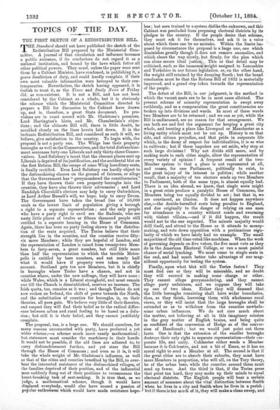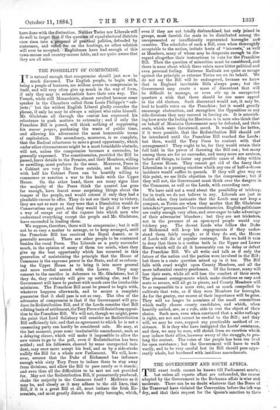TOPICS OF THE DAY.
THE FIRST SKETCH OF A REDISTRIBUTION BILL. THE Standard should not have published the sketch of the Redistribution Bill prepared by the Ministerial Com- mittee. A journal of that circulation and influence becomes a public nuisance, if its conductors do not regard it as a national institution, and bound by the laws which fetter all other political powers. They must, unless the paper were sent them by a Cabinet Minister, have condoned, in publishing it, a grave dereliction of duty, and could hardly complain if their own most valuable information were betrayed to their con- temporaries. Nevertheless, the sketch having appeared, it is foolish to treat it, as the Times and Daily News of Friday did, as non-existent. It is not a Bill, and has not been considered by the Cabinet as a whole, but it is obviously the scheme which the Ministerial Committee directed to prepare a Bill for discussion in the Cabinet have drawn up, and is, therefore, a great State document. Its pro- visions are in exact accord with Mr. Gladstone's promises, Lord Hartington's hints, and Mr. Chamberlain's objec- tions; and the ultimate Bill will, there is little doubt, be moulded closely on the lines herein laid down. It is the inchoate Redistribution Bill, and considered as such it will, we believe, give satisfaction to the country. To begin with, the proposal is not a party one. The Whigs lose their property boroughs as well as the Conservatives, and the total disfranchise- ment sentences forty-one Liberals and only thirty-three Conser- vatives. Lord Salisbury's taunt that the obscure places sent up Liberals is deprived of its justification, and the accidental blot on the first Reform Bill, the escape of some Whig hereditary seats, is finally rectified. Even Lord Salisbury can hardly object to the disfranchising clauses on the ground of fairness, or allege that the Government has "gerrymandered the constituencies." If they have thrown their own property boroughs into the counties they have also thrown their adversaries' ; and Lord Randolph Churchill's electors may help to carry Oxfordshire, as Lord Arthur Russell's will, we hope, help to carry Devon. The Government have taken the broad line of 10,000 souls as the lowest limit of population giving a borough a right to a separate representation ; and the only people who have a party right to cavil are the Radicals, who see nasty little places of twelve or fifteen thousand people still entitled to a separate hearing in the House of Commons. Again, there has been no party feeling shown in the distribu- tion of the seats acquired. The Tories believe that their strength lies .in the counties, and the counties receive fifty- six "more Members; while they are hopeful of London and the representation of London is raised from twenty-two London, to forty-seven, a great number, but still little more than half the representation to which the terrible Metro- polis is entitled by bare numbers, and not nearly half what it would have if property were taken into the account. Scotland gets ten new Members, but it is chiefly in boroughs where Tories have a chance, and not in counties where, under the new suffrage, they will have none ; while Wales, which is a Liberal stronghold, and must remain one till the Church is disestablished, receives no increase. The Irish quota, too, remains as it was ; and though Tories do not now reckon on Ireland, the shift of power towards the North, and the substitution of counties for boroughs, is, on their theories, all pure gain. We believe very little of their theories, and suspect they will End their belief as to the radical differ- ence between .urban and rural feeling to be based on a delu- sion; but still it is their belief, and they cannot justifiably complain.
The proposal, too, is a large one. We should ourselves, for many reasons unconnected with party, have preferred a yet wider scheme,—a scheme much more nearly mathematical ; but statesmen must consider the machinery in their hands. It would not be possible, if the old lines are adhered to, to carry disfranchisement further, and yet steer the Bill through the House of Commons • and even as it is, it will take the whole weight of Mr. Glastone's influence, as well as that of the cities and counties benefited by the Bill, to over- bear the interested resistance of the disfranchised villages, of the families deprived of their position, and of the influential men suddenly flung out of their positions to recommence the heart-breaking task of seat-seeking. It is true that, as we judge, a mathematical scheme, though it would have displaced everybody, would also have roused a passion of less ; but men trained to a system dislike the unknown, and this Cabinet was precluded from proposing electoral districts by its -pledges to the country. If the people desire that scheme, they must ask it for themselves, and ask it in a voice about which there can be no mistake. Within the limits im- posed by circumstance the proposal is a large one, one which diminishes greatly though it does not remove anomalies, and which clears the way slowly, but firmly, for the plan which can alone secure ideal justiceiix This or that detail may be criticised, such as the immens#Seight assigned to Lancashire and Yorkshire in our future legislation, or, on the other hand, the weight still retained by the decaying South ; but the broad. conclusion must be that the Reform Bill of 1832 is materially improved, and a grand step taken towards the representation of the people.
The defect of the Bill, in our judgment, is the method in which the vacant mats are to be in most cases allotted. The present scheme of minority representation is swept away ruthlessly, and as a compensation the great constituencies are broken up into divisions and wards. In most of these wards two Members are to be returned ; and we can as yet, while the Bill is undiscussed, see no reason for that arrangement. We can both see and feel the argument for keeping a great city whole, and treating a place like Liverpool or Manchester as a living entity which must not be cut up. History is on that side, and citizen prejudice, and that pride in corporate life which, in the decay of respect for individualities, it is so wise to cultivate ; but if these impulses are set aside, why stop at such large divisions ? Why not divide still more, and by making seats in such cities single, allow the representation of every variety of opinion ? A frequent result of the two- Member system is that a place is not represented at all, and ceases, for one Parliament, politically to exist, to the great injury of its interest in politics ; while another result, that a majority of ten electors sends up two Members to Parliament, both of the same type, is almost equally bad. There is an idea abroad, we know, that single seats might in a great crisis produce a paralytic House of Commons, the Members being too equally divided to act • but that is, we are convinced, an illusion. It does not happen anywhere else,—the double-barrelled seats being peculiar to England, and due originally to the danger of relying on one man for attendance in a country without roads and swarming with violent villains,—and if it did happen, the result would not be the one expected. The minute majority would drill itself, and attend to the House as it attends to money- making, and vote down opposition with a pertinacious regu- larity of which we have lately had no example. The small majorities of the old time voted like machines. When the work of governing depends on five voters, the five must vote as they do in the American Electoral 'College, or run a most painful chance of social lynching. " We must come to single seats in the end, and had much better take "advantage of our mag- nificent opportunity for testing the system.
Finally, upon what blot will the Tories fasten ? They must find one or they will be miserable, and no doubt they will succeed in making some charge or other. They cannot allege gerrymandering, - and- they cannot allege party unfairness, and we Suppoie they will take up one of two ideas. Either they will demand that . the little boroughs remaining shall have wider boundaries, thus, as they think, leavening them "with wholesome rural , views, or they will insist that the large boroughs shall. be extended so as to withdraw from the counties unwhole- some urban influences. We do not care much about the matter, not believing at all in this imaginary scission in the grey matter of English brains, and being quite as confident of the conversion of Hodge as of the conver- sion of Handicraft ; but we would just point out three facts. One is that the extension of the smaller boroughs destroys their only right to separate representation—their cor- porate life, and unity. Colchester either sends a Member because it is Colchester, and not a bit of Essex, or it has no moral right to send a Member at all. The second is that if the great cities are to absorb their suburbs, they must have more Members in proportion, who will all, on the Tory theory, be of the urban tone, while the counties around them must send up fewer. And the third is that, if the Tories press that point too hard, they may make up their minds to equal electoral districts. The English people will bear a certain amount of nonsense about the vital distinction between Smith when he lives in a city and Smith when he lives in a parish ; have done with the distinction. Neither Tories nor Liberals will once rises into a do well to forget town-mouse and country-mouse fable, and are quite aware that statesmen, and will ever be accepted. Englishmen have had enough of this if the questk, of equalelectoral districts posal of pratie.al politics, defended by '-fer on the hustings, no other solution they are all mice.



































 Previous page
Previous page